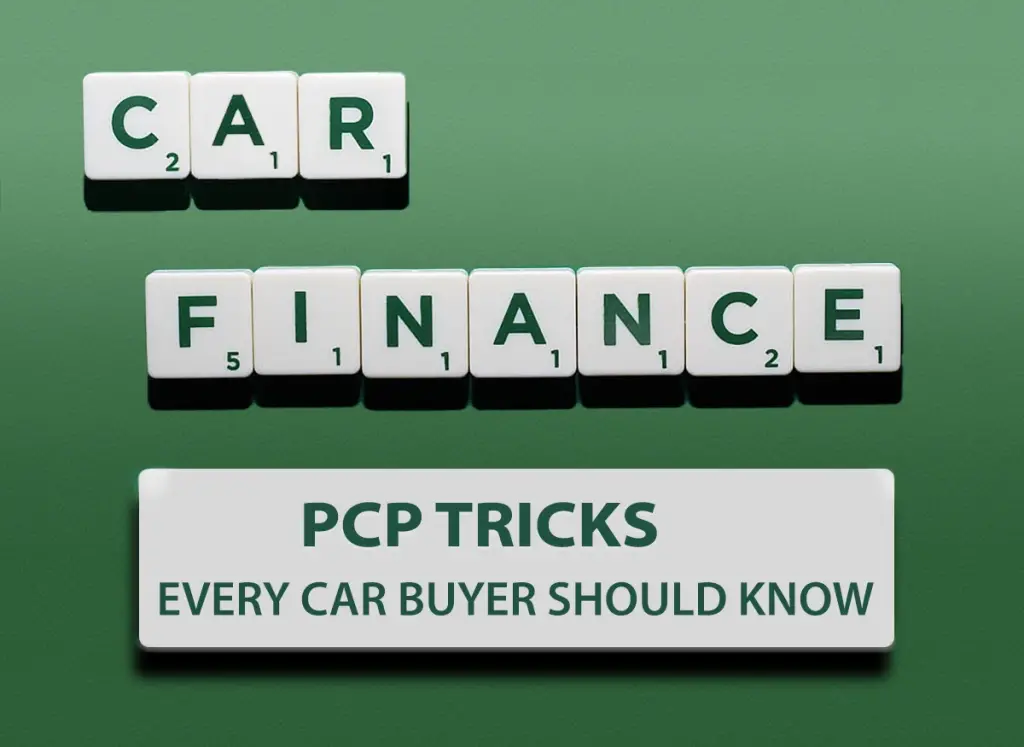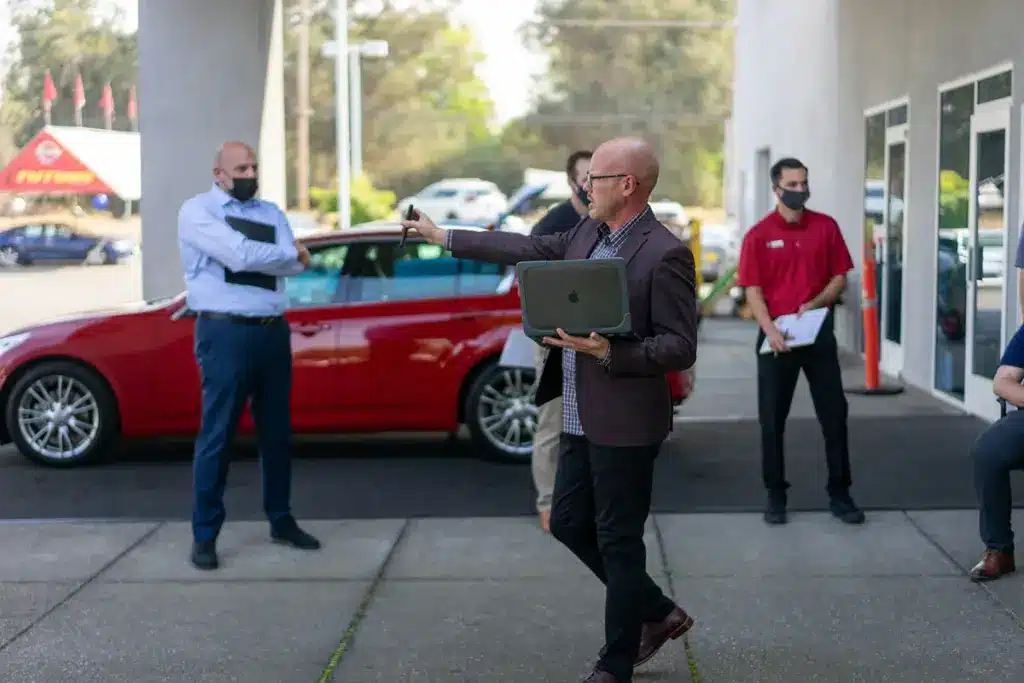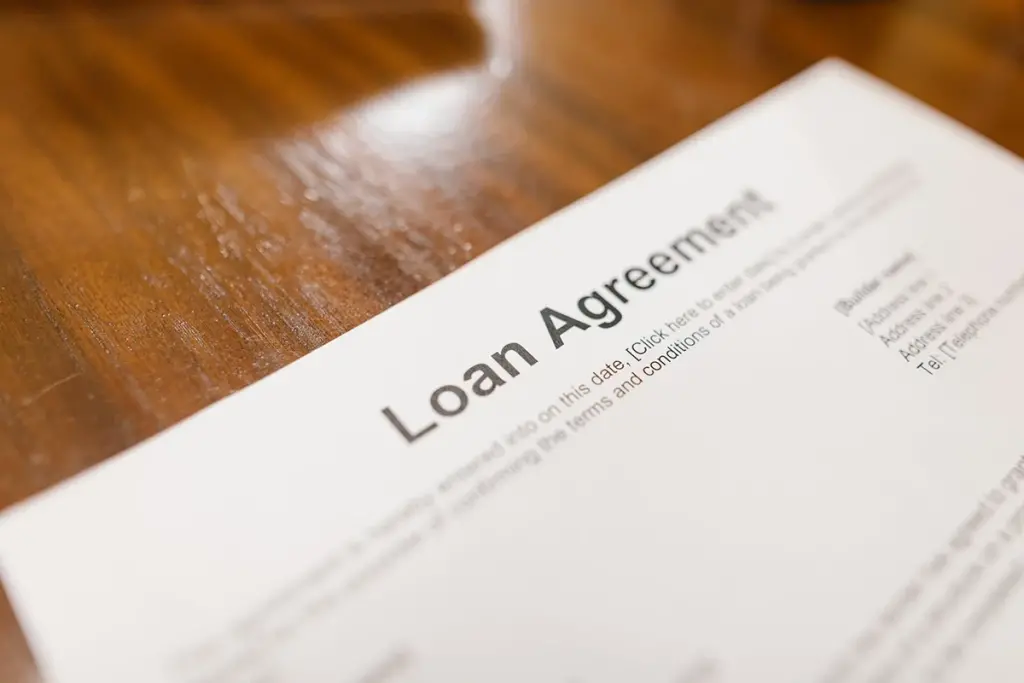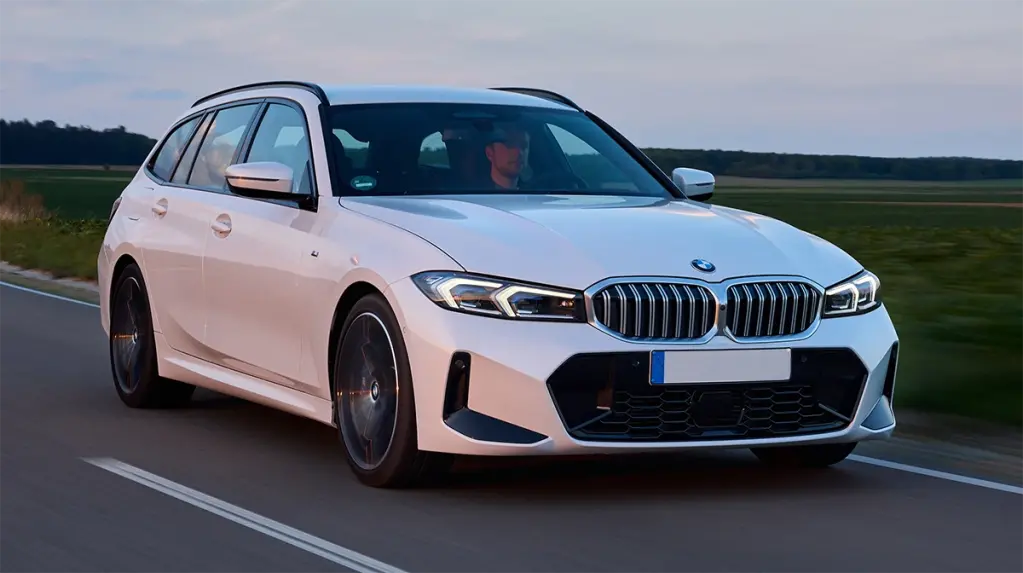PCP: Everything You Need To Know

Buyer Beware – Not All Car Loans Are Fair
PCP or HP finance options offered by car dealerships: the gateway to the car of your dreams, or a pathway to financial deceit? While many offer genuine deals, the actions of a few shady car dealers can tarnish the entire industry’s reputation.

Car salesmen, often the punchline of jokes, wield their selling skills with creativity, sometimes at the expense of buyers’ wallets.
Heard about the dealer who brought a ladder to help customers reach high interest rates? Here’s the true story of two car dealers who helped customers reach higher interest rates without the use of a ladder.
Car Finance A Multibillion-Pound Market
With over 2.2 million Britons borrowing a staggering £44.8 billion annually for car finance, it’s evident that buying a car isn’t just a purchase—it’s an investment. It’s also a hotly competed marketplace for lenders but do they all play fair?
To Finance or Not to Finance?
Car finance offers a path to dreams for some and a practical solution for others. For those seeking the latest model every few years or avoiding immediate depreciation, it’s a tempting proposition.
Unveiling Car Loan Mis-selling

Enter the storm of car loan mis-selling, where fair play and trust are put to the test. Banned in 2021 by the FCA, discretionary commissions arrangements between lenders and dealers have come under renewed scrutiny, revealing a dim world of non-transparency and hidden incentives to the detriment of buyers.
What Is A Discretionary Commissions Arrangement?
Up until the beginning of 2021, some car finance lenders allowed car dealers to change the interest rates offered to car buyers using finance.
Car dealers earned a commission based upon interest rates, the higher the rates, the higher the commission earned.
The Regulatory Rumble
The Financial Ombudsman Service (FOS) sounded the alarm again with two upheld complaints, prompting the Financial Conduct Authority (FCA) to launch a new investigation in discretionary commissions arrangements. This inquiry could potentially reshape the current practices of lenders.
You can read more about the FCA probe into these two cases here.
While no blame is assigned, the pressing need for regulatory clarity is undeniable. Notably, the FOS refrained from criticising the lenders involved.
However, one could infer that this was an indirect signal for the FCA to address regulatory ambiguities that are still present today which may inadvertently disadvantage customers.
Navigating the Car Finance Landscape

Discretionary commissions arrangements were banned by the FCA in 2021 but as car buyers, it’s still crucial to tread carefully in the realm of car finance.
While the majority of lenders and dealer do not engage in questionable practices, awareness and due diligence are key to avoiding financial pitfalls.
In 2023, an estimated 20% to 30% of all vehicles sold were financed, prompting us to delve into the true cost of car financing in 2024.
To unravel this, we selected one of the UK’s most leased vehicles and compared quotes from reputable lenders.
While exploring the realm of car finance, it’s important to know that thanks to current regulation, dealerships and online car finance providers are obliged to offer you the rate you are eligible for, plus their pre-agreed commission.
However this does not mean every finance provider offers the same rate, so before you sign up for the dealer offering, it may be wise to check an online car finance specialist, you might be surprised at the savings, we were! (See our example below under Online Car Finance Specialist).
HP Or PCP
HP and Personal Contract Purchase (PCP), a quick definition.
HP
Hire Purchase (HP) is a type of car finance arrangement that allows you to spread the cost of buying a car over a fixed period, typically two to five years.
With HP, you make an initial deposit, usually around 10-20% of the car’s value, and then pay off the remaining balance in monthly installments. Legal ownership of the car is transferred to you after you make the final payment, the car can be repossessed if you don’t keep up with payments.
Here’s how Hire Purchase works:
1. Deposit: You make an initial deposit, often called a “down payment,” which is typically a percentage of the car’s total price. The amount of the deposit can vary depending on the lender and your creditworthiness.
2. Monthly Payments: After paying the deposit, you’ll make fixed monthly payments over the agreed-upon term (usually 2 to 5 years) to cover the remaining balance of the car’s purchase price, plus any interest charges.
3. Ownership: Unlike some other finance options like leasing, with Hire Purchase, you have the option to own the car the beginning of the agreement. However, legal ownership is only transferred to you after you’ve made the final payment, including any option to purchase fees.
4. Interest Rates: The monthly payments you make include both the repayment of the loan principal (the amount you borrowed) and the interest charges. The interest rate is typically fixed for the duration of the agreement, making it easier to budget for.
5. Responsibilities: Since you own the car, you’re responsible for maintenance, insurance, and any other costs associated with ownership.
6. End of Agreement: Once you’ve made all the monthly payments, including any final balloon payment if applicable, you’ll own the car outright, and no further payments are required.
You’ll receive a “settlement” or “termination” figure from the lender, indicating the final payment required to transfer ownership officially.
Advantages of Hire Purchase:
– You own the car outright at the end of the agreement.
– Fixed monthly payments make budgeting easier.
– Generally, lower interest rates compared to other finance options for buying a car.
– No mileage restrictions or excess wear and tear charges.
Disadvantages of Hire Purchase:
– Higher monthly payments compared to PCP.
– You’re responsible for the full cost of maintenance and repairs.
– You do not own the car until the final payment is made, which means the lender can repossess it if you fail to keep up with payments
– You could end up in a negative equity position if your car depreciates in value before you finish payments
Personal Contract Purchase (PCP)
PCP, or Personal Contract Purchase, is a popular form of car finance that offers lower monthly payments compared to traditional Hire Purchase (HP) or car loans.
PCP is a type of lease agreement that allows you to use the car for a set period, typically 2 to 4 years, with the option to purchase it at the end of the contract.
Here’s how PCP works:
1. Deposit: You make an initial deposit, usually equivalent to a few months’ worth of payments or a percentage of the car’s value, it’s typically lower than what’s required for HP.
2. Monthly Payments: After the deposit, you make fixed monthly payments for the duration of the agreement. These payments cover the depreciation of the car’s value over the lease period, plus interest charges.
3. Guaranteed Future Value (GFV): At the beginning of the agreement, the finance company sets an estimated value for the car at the end of the contract, known as the Guaranteed Future Value (GFV). This is based on factors like the car’s age, mileage, and condition at the end of the contract.
4. Option at the End of the Contract: At the end of the PCP agreement, you have three options:
– Return the Car: If you no longer want the car, you can simply return it to the finance company and the agreement ends, provided it meets the agreed-upon mileage and condition standards. You would be charged for any excess mileage above the amount you agreed to at the beginning of the agreement or for any damage deemed beyond normal wear and tear.
– Keep the Car: You can make the final payment, also known as the balloon payment or the GFV, and take ownership of the car outright.
– Trade-In or Refinance: If the car’s value is higher than the GFV, you can use the equity as a deposit for a new PCP agreement or refinance the remaining amount.
5. Responsibilities: Throughout the agreement, you’re responsible for maintaining the car and keeping it in good condition. You’ll also need to ensure the car is insured comprehensively.
Advantages of PCP:
– Lower monthly payments compared to HP or traditional car loans, as you’re only financing a portion of the car’s value.
– Flexibility at the end of the contract to choose whether to return, keep, or trade-in the car.
– Protection against depreciation, as the GFV provides a guaranteed minimum value for the car at the end of the agreement.
Disadvantages of PCP:
– Subject to mileage restrictions and excess wear and tear charges
– You don’t own the car until you make the final balloon payment (GFV), which means the lender can repossess it if you fail to keep up with payments. You will also need to budget for the final balloon payment (GFV) or refinance the amount if you want to keep the car.
– Potential additional fees at the end of the contract, such as excess mileage charges or damage fees.
Determining the Real Cost of Car Finance
In our pursuit to uncover the true expenses associated with car financing, we carefully selected one of the UK’s most commonly financed vehicles and compared quotes from two reputable finance providers for both HP and PCP finance.

Our chosen specimen was a nearly new BMW 3 Series 320d Sport Saloon 2.0 4dr, with less than 10,000 miles on the odometer, listed on Autotrader for £32,150 (at the time of writing).
Car Finance Specialists
To simplify our comparison process, we decided to juxtapose Autotrader’s in-house car finance options with Magnitude Finance, a reputable specialist in car finance with a 5 star Trust Pilot rating and an easy-to-use online car finance calculator making it easy for us to swiftly acquire comparative quotes.
The outcomes underscore the potential savings attainable by exploring your options before committing.
The Results
PCP (Personal Contract Purchase)
| Autotrader | PCP Representative example |
| Contract length | 48 months |
| Monthly payments | £447.73 |
| Car price | £32,150 |
| Cash deposit | £3,215 |
| Lender contribution | £700 |
| Representative APR | 10.5% |
| Total amount of credit | £28,235 |
| Total charges payable | £9,045.36 |
| Total amount payable | £41,195.36 |
| Fixed rate of interest pa | 10.5% |
| Optional final (Balloon) payment | £16,237.05 |
| Option to purchase fee | £0 |
| Mileage per year | 10,000 |
| Excess mileage fee | 11.17p/mile. |
| Magnitude Finance | PCP Representative example |
| Contract length | 48 months |
| Monthly payments | 435.63 |
| Car price | £32,150 |
| Cash deposit | £3,215 |
| Lender contribution | £0 |
| Representative APR | 8.9% |
| Total amount of credit | £28,935 |
| Total charges payable | £7,839.61 |
| Total amount payable | £39,989.61 |
| Fixed rate of interest pa | 8.9% |
| Optional final (Balloon) payment | £16,290.00 |
| Option to purchase fee | £10 |
| Mileage per year | 10,000 |
| Excess mileage fee | 22p/mile. |
HP (Hire Purchase)
| Autotrader | HP Representative example |
| Contract length | 48 months |
| Monthly payments | £716.47 |
| Car price | £32,150 |
| Cash deposit | £3,215 |
| Lender contribution | £700 |
| Representative APR | 10.5% |
| Total amount of credit | £28,235 |
| Total charges payable | £6155.56 |
| Total amount payable | £38,305.56 |
| Fixed rate of interest pa | 10.5% |
| Optional final (Balloon) payment | £N/A |
| Option to purchase fee | £N/A |
| Mileage per year | 10,000 |
| Excess mileage fee | 11.17p/mile. |
| Magnitude Finance | HP Representative example |
| Contract length | 48 months |
| Monthly payments | £713.79 |
| Car price | £32,150 |
| Cash deposit | £3,215 |
| Lender contribution | £0 |
| Representative APR | 8.9% |
| Total amount of credit | £28,935 |
| Total charges payable | £5,336.912 |
| Total amount payable | £37,486.92 |
| Fixed rate of interest pa | 8.9% |
| Optional final (Balloon) payment | £N/A |
| Option to purchase fee | £N/A |
| Mileage per year | 10,000 |
| Excess mileage fee | 22p/mile. |
Unlocking Value: PCP Advantages Explored
When considering a vehicle valued at £32,500 today, PCP emerges as a compelling choice, boasting lower monthly payments and the tantalizing opportunity to outright own the vehicle for a balloon payment of £16,300 (including a nominal £10 fee).
Harnessing Savings: The Importance of Comparison Shopping
It pays dividends to explore different PCP quotes. For instance, Magnitude Finance’s offer flaunts an APR of 8.9%, significantly undercutting Autotrader’s 10.5% APR. This disparity translates into tangible savings exceeding £1200.
Maximising Returns: Secondhand Market Insights
Analysing the current resale trends of the BMW 3 series reveals a lucrative opportunity. With proper maintenance and adherence to mileage limits (10,000 miles per annum), the vehicle could fetch anywhere from £18,000 to £25,000 post a 48-month PCP agreement.
Strategic Choices: Maximizing Profit Potential
In a hypothetical scenario, retaining the vehicle could yield savings up to £8,700 if prevailing used car sales patterns persist. Alternatively, opting to settle the balloon payment and selling the vehicle privately opens avenues to offset PCP costs with an £8,700 profit.
Leveraging the vehicle as part exchange for a higher value model presents yet another avenue worth considering.
Conclusion
Capitalizing on PCP’s Advantages
With PCP, the allure of reduced monthly payments is undeniable. Yet, its true strength lies in the potential to secure the vehicle below market value, offering the flexibility to either maintain ownership or leverage its resale value to drive down the overall cost of car finance.
Strategic Vehicle Selection: Maximising Returns
Choosing a vehicle with a low depreciation rate, such as those from Mercedes, BMW, Porsche, or VW, amplifies these advantages, empowering you to optimise returns. Your vehicle selection can significantly impact the financial outcome, so choose wisely—it could be the key to substantial savings.
Luxury in Reach: PCP for Prestige Vehicles
For those with the means, PCP opens doors to luxury and prestige vehicles like Lamborghini, Ferrari, and Porsche. Surprisingly, with PCP, there’s even a chance for these high-end machines to appreciate in value by the agreement’s end, enabling a dream car experience at minimal expense.
The Versatility of HP: A Viable Alternative
While PCP emerges as the preferred choice, HP has its merits, especially for motorists seeking long-term ownership and stability. While HP doesn’t shield against depreciation, its obligatory ‘Voluntary Termination’ clause provides an exit strategy without penalty, under certain conditions, offering peace of mind to those committed to keeping their vehicle.
In conclusion, while PCP shines brightly, HP remains a viable option for those with different priorities and preferences. Ultimately, the decision hinges on your individual circumstances, goals, and driving desires.
Note:: While we bring you insights into various aspects of the motoring world, it’s crucial to clarify our commitment to impartiality. Our exploration of car finance in today’s article involves insights from one of our sponsors, Magnitude Finance, as they aptly put, ‘Empowering individuals with flexible financial solutions for their dream cars.’ While we appreciate their perspective on the finance landscape, rest assured that our primary goal is to provide you with unbiased and comprehensive information, enabling you to make informed decisions in the realm of car financing.
Disclaimer: This Smart Motoring article is intended for educational purposes exclusively. Despite our diligent efforts to present an accurate and impartial viewpoint, it should not be construed as financial advice in any manner. It is not suitable for basing financial decisions upon. If you are considering car finance, we strongly advise seeking independent expert guidance.
For more articles like this, receive our weekly e-newsletter, including partner deals and all things motoring, register your email below.
Please note: You cannot subscribe to Smart-Motoring unless you put a tick in the checkbox below to indicate have read and agreed to our privacy policy.




Leave a Reply
You must be logged in to post a comment.